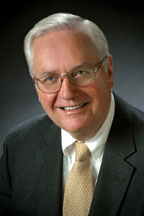|
Web Exclusives: Alumni Spotlight April 5, 2006:
What’s in a name? Since he was a boy, Alex McLeod ’56 has been interested in his Scottish roots. Growing up in North Carolina, there were many reminders of the family history, such as the oil painting depicting a Scottish landscape that hung in his grandparents’ house. Each year when photographs were taken at a church gathering, groups were arranged by their Scottish clans. At Princeton, where he studied German and music in the Special Program in European Civilization, McLeod gained a new appreciation for his Scottish identity when he realized that Scotsmen such as John Witherspoon and James McCosh had played leading roles in shaping the University. Interest in his McLeod origins did not fade with time. While serving as a Navy doctor with a Marine air squadron in North Carolina in the early 1960s, McLeod researched the McLeod genealogy, managing to trace all the descendants of his great- great-great-grandparents, who had emigrated from the Isle of Skye in 1802. He also became involved with the Clan MacLeod Society USA and the Associated Clan MacLeod Societies (ACMS), an international organization for people with roots in the ancient MacLeod clan of Scotland. (The spelling of the clan name varies among families.) Now retired from his internal medicine practice in Nashville, and president of the ACMS, McLeod has used his clan involvement to contribute to the burgeoning field of human population genetics, which uses genetic information to help tease out the origins of human populations and track the history of their movements around the globe. Three years ago, McLeod came across an article about research that traced patterns of Viking settlement in Britain by testing the DNA of modern British populations. He contacted the lead scientist, David Goldstein, then at University College, London, who was just about to embark on one of the first large-scale studies of the link between surnames and the Y chromosome. McLeod offered to recruit MacLeods from around the world to participate in the study. Y chromosomes are passed only from father to son, so in theory, people who share the same surname should also share certain genetic markers on the Y chromosome. More than 500 male MacLeod volunteers, including Alex, took part in Goldstein’s study, providing DNA by swabbing the insides of their mouths. The study, concluded in 2004, showed that 32 percent of the MacLeods
sampled share a common ancestor who lived approximately 1,000 years
ago. This corroborates clan tradition, which holds that the MacLeod
progenitor was Leod, son of Olaf the Black, a Viking who lived in
the early 13th century. The study also indicated that the sample
had its origins in the Isle of Man or Scotland. The ACMS has made
arrangements to continue the MacLeod research privately through
the commercial firm Family Tree DNA. “I’d give anything
to be alive 50 years from now,” says McLeod, “because
that’s when you’re really going to see results from
this [research] that will tell a huge story about the migrations
of mankind.” By Carol Zall ’88 Carol Zall ’88 is a freelance writer in Cambridge, Mass.
|
||

